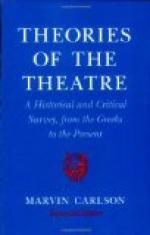We are thus confronted with the anomalous condition of a business man offering for sale, at the regular price, goods which he knows to be inferior, because he thinks that there are just enough customers available who are sufficiently uncritical not to detect the cheat. Thereby he hopes to cover the rent of an edifice which he has built, in defiance of sound economic principles, in a community that is not prepared to support it throughout the year. No very deep knowledge of economics is necessary to perceive that this must become, in the long run, a ruinous business policy. Too many theatres showing too many plays too many months in the year cannot finally make money; and this falsity in the economic situation reacts against the dramatic art itself and against the public’s appreciation of that art. Good work suffers by the constant accompaniment of bad work which is advertised in exactly the same phrases; and the public, which is forced to see five bad plays in order to find one good one, grows weary and loses faith. The way to improve our dramatic art is to reform the economics of our theatre business. We should produce fewer plays, and better ones. We should seek by scientific investigation to determine just how many theatres our cities can support, and how many weeks in the year they may legitimately be expected to support them. Having thus determined the real demand for plays that comes from the theatre-going population, the managers should then bestir themselves to secure sufficient good plays to satisfy that demand. That, surely, is the limit of sound and legitimate business. The arbitrary creation of a further, false demand, and the feverish grasping at a fictitious supply, are evidences of unsound economic methods, which are certain, in the long run, to fail.
III
THE HAPPY ENDING IN THE THEATRE
The question whether or not a given play should have a so-called happy ending is one that requires more thorough consideration than is usually accorded to it. It is nearly always discussed from one point of view, and one only,—that of the box-office; but the experience of ages goes to show that it cannot rightly be decided, even as a matter of business expediency, without being considered also from two other points of view,—that of art, and that of human interest. For in the long run, the plays that pay the best are those in which a self-respecting art is employed to satisfy the human longing of the audience.
When we look at the matter from the point of view of art, we notice first of all that in any question of an ending, whether happy or unhappy, art is doomed to satisfy itself and is denied the recourse of an appeal to nature. Life itself presents a continuous sequence of causation, stretching on; and nature abhors an ending as it abhors a vacuum. If experience teaches us anything at all, it teaches us that nothing in life is terminal, nothing is conclusive. Marriage




